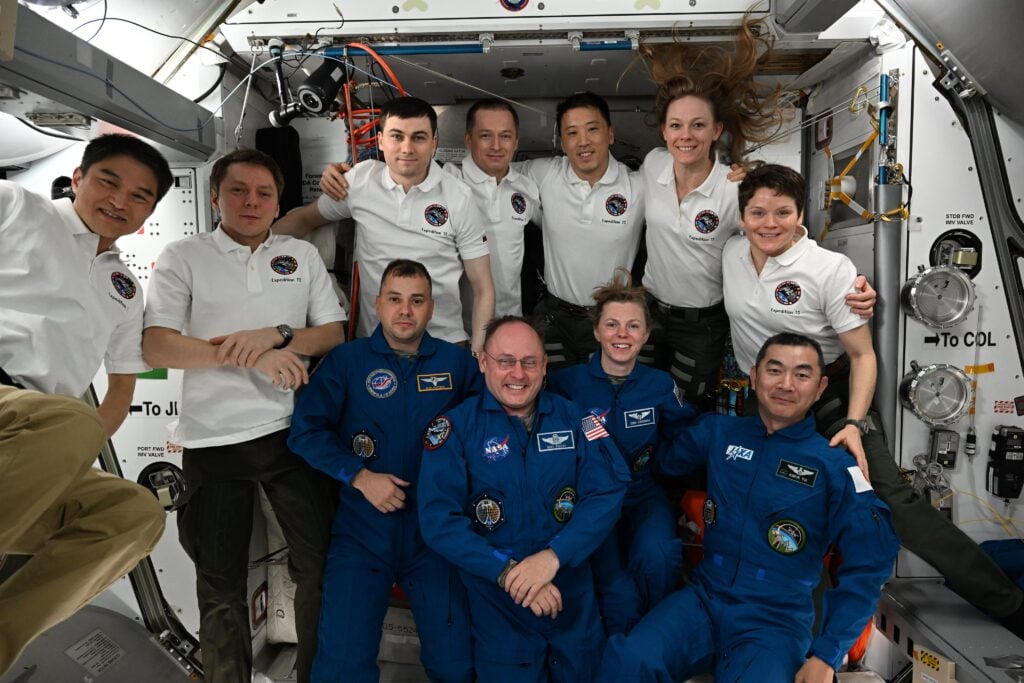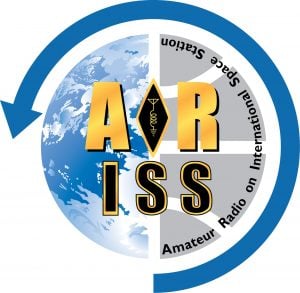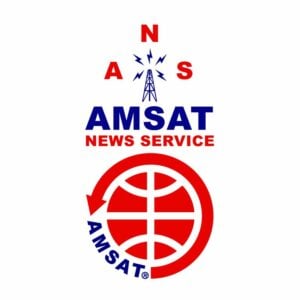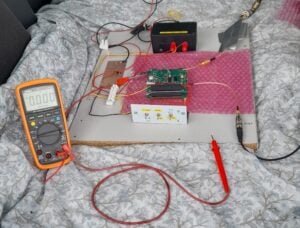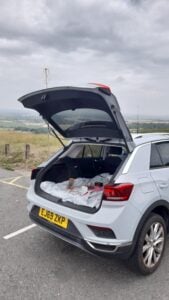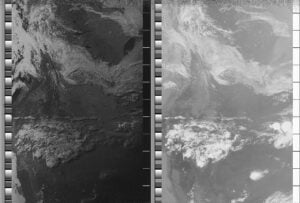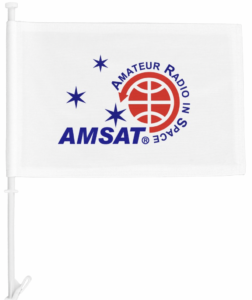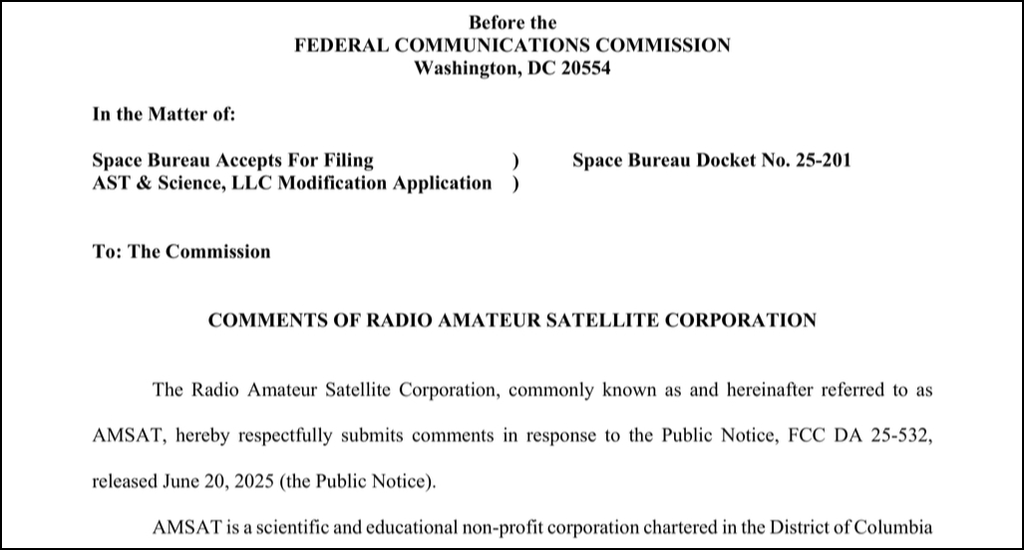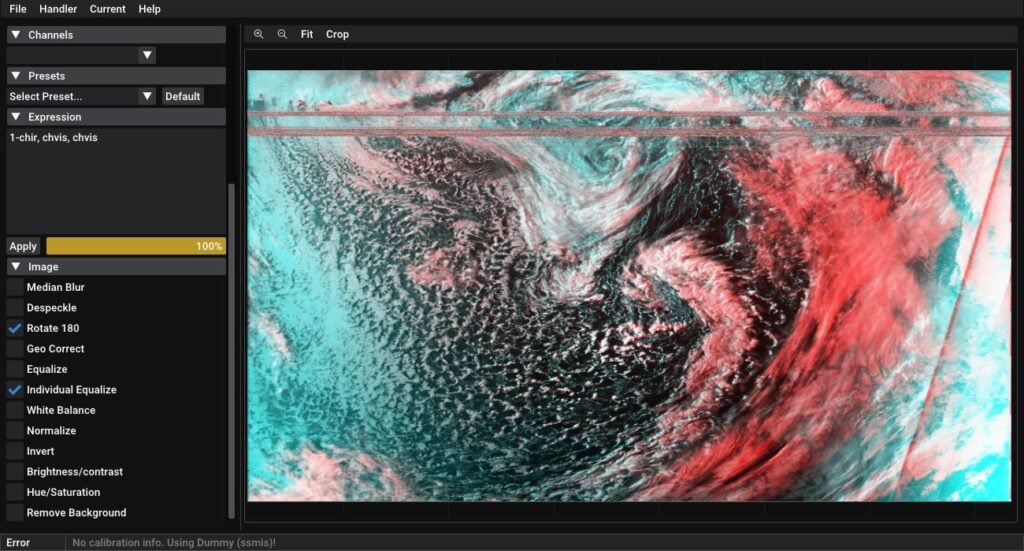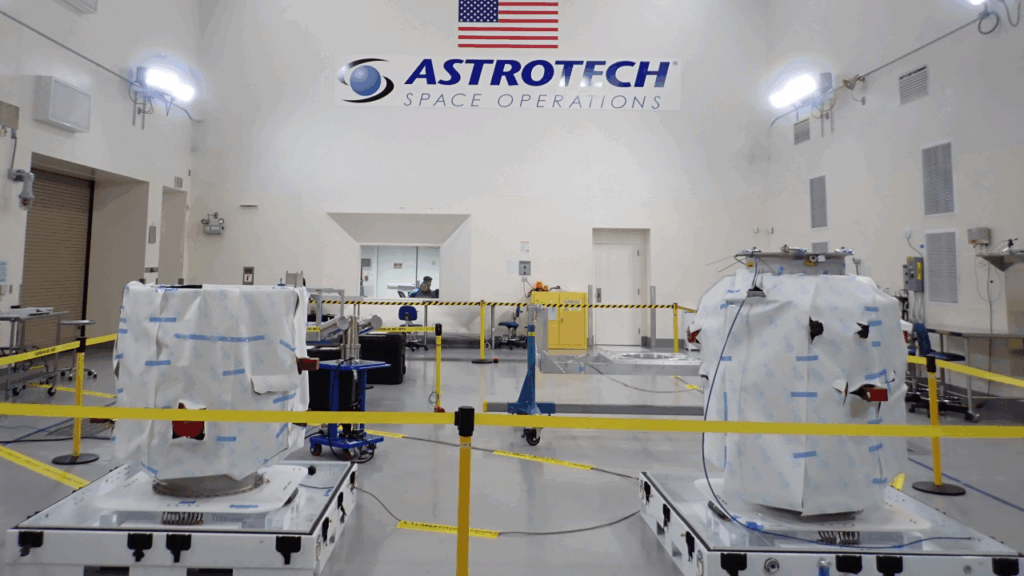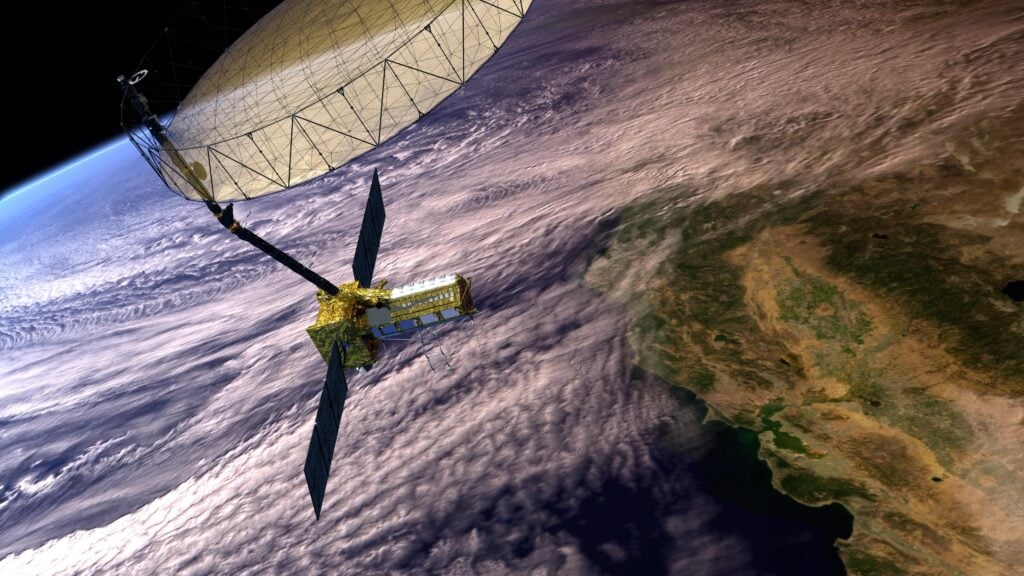In this edition:
* MESAT1 Named a Finalist in Global Satellite Contest
* 2025 AMSAT Board of Directors Election Continues
* AMSAT Organizations Continue to Challenge AST SpaceMobile Use of Ham Radio Spectrum
* Registration Remains Open for AMSAT Symposium, Presentations Invited
* NASA Satellite May Be Destroyed On Purpose
* Changes to AMSAT-NA TLE Distribution
* ARISS News
* AMSAT Ambassador Activities
* Satellite Shorts From All Over
The AMSAT News Service bulletins are a free, weekly news and information service of AMSAT, the Radio Amateur Satellite Corporation. ANS publishes news related to Amateur Radio in Space including reports on the activities of a worldwide group of Amateur Radio operators who share an active interest in designing, building, launching and communicating through analog and digital Amateur Radio satellites.
The news feed on http://www.amsat.org publishes news of Amateur Radio in Space as soon as our volunteers can post it.
Please send any amateur satellite news or reports to: ans-editor [at] amsat.org
Sign up for free e-mail delivery of the AMSAT News Service Bulletins via the ANS List; to join this list see: https://mailman.amsat.org/postorius/lists/ans.amsat.org/
MESAT1 Named a Finalist in Global Satellite Contest
MESAT1 (MO-122), Maine’s first research satellite developed by the University of Maine and with collaboration from AMSAT Engineering, was a finalist for the SmallSat “Rookie of the Year” Award, which is sponsored by the American Institute of Aeronautics and Astronautics.
The public was encouraged to cast their vote online to boost MESAT1 to victory as the top rookie small satellite mission. Voting was free and open to everyone through August 12. MESAT1 was among seven small satellites vying for the title.
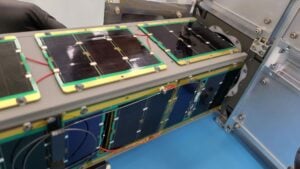
MO-122 (Photo: University of Maine)
Launched into orbit on July 4, 2024, MESAT1 was developed to get students involved in space science. The cost-effective nanosatellite, which measures 11.8 inches, is outfitted with four multispectral cameras that were designed to capture climate-related Earth imagery for experiments designed by Maine K-12 students. An AMSAT-provided LTM-1 linear transponder provides services to amateur radio enthusiasts around the world. In October of 2024, at the request of University of Maine, AMSAT designated MESAT1 as MESAT1-OSCAR 122 (MO-122).
“Access to space data motivates and excites students to learn fundamental skills in mathematics and science and helps them see the importance of STEM careers,” said UMaine Vice President for Research and Dean of the Graduate School Kody Varahramyan, who led the establishment of UMaine’s Space Initiative. “Being selected as a finalist for SmallSat Rookie of the Year is a national recognition of what Maine students and their faculty researchers can accomplish together.”
Finalists for the SmallSat award included teams from the University of Arizona, the University of Nebraska–Lincoln and international missions from Senegal and Croatia. MESAT1 stands out as a mission that empowered K–12 students from Falmouth High School, Fryeburg Academy and Saco Middle School to contribute to space exploration.
The winner, announced during the 39th Annual Small Satellite Conference from Aug. 10-13 in Salt Lake City, was CroCube the first Croatian satellite. CroCube also operates as an amateur radio satellite with a CW beacon and a GFSK9k6 – AX.25 G3RUH telemetry beacon at 436.775 MHz.
MESAT1 was designed, built and tested by students and faculty at UMaine in partnership with the University of Southern Maine, the Wells National Estuarine Research Reserve and AMSAT, the Radio Amateur Satellite Corporation, with support from NASA and the Maine Space Grant Consortium. The satellite’s development and integration for launch was led by Ali Abedi, who formerly served as associate vice president for research and a professor at UMaine.
This effort is part of the broader UMaine Space Initiative, which is working to develop a skilled space workforce and grow Maine’s presence in the space economy, including plans for a future Maine SpacePort Complex.
“This recognition puts Maine on the map as a state that not only builds satellites, but also builds opportunities — for students, teachers, researchers and entrepreneurs,” Varahramyan said.
[ANS thanks The University of Maine and smallsat.org for the above information]
Your 2025 AMSAT President’s Club Coin Is Waiting!
Celebrating the 40th Anniversary of Amateur Radio on Human Spaceflight
Help Support GOLF and Fox Plus.
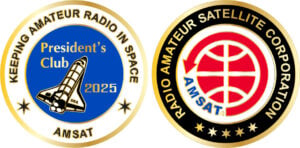
Join the AMSAT President’s Club today and help
Keep Amateur Radio in Space!
https://www.amsat.org/join-the-amsat-presidents-club/
2025 AMSAT Board of Directors Election Continues
The nomination period for the 2025 AMSAT Board of Directors Election ended on June 15, 2025. The following candidates have been duly nominated and their candidate statements can be found at link that follows:
Barry Baines, WD4ASW
Jerry Buxton, NØJY
Drew Glasbrenner, KO4MA
Frank Karnauskas, N1UW
Douglas Tabor, N6UA
As four seats on the Board of Directors are up for election this year, the four candidates receiving the largest number of votes shall be declared elected to the seats. The candidate receiving the next largest number of votes shall be declared the First Alternate. The voting period opened on July 15, 2025 and shall conclude on September 15, 2025. Results will be announced no later that September 30, 2025.
AMSAT members may review the candidate statements and cast their ballots at https://launch.amsat.org/2025-BoD-Election
[ANS thanks Douglas Tabor, N6UA, AMSAT Secretary, for the above information]
Need new satellite antennas?
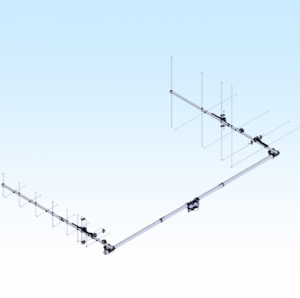 Purchase M2 LEO-Packs from the AMSAT Store.
Purchase M2 LEO-Packs from the AMSAT Store.
When you purchase through AMSAT, a portion of the proceeds goes towards
Keeping Amateur Radio in Space.
https://amsat.org/product-category/hardware/
AMSAT Organizations Continue to Challenge AST SpaceMobile Use of Ham Radio Spectrum
Facing more than 2,500 complaints from amateurs, AST SpaceMobile has responded by telling the FCC that it has designed its satellites to “mitigate interference” with amateur radio bands.
On August 5, the company replied to the U.S. Federal Communications Commission, defending its plan to use the 430 to 440MHz radio bands outside the U.S. to track and control its proposed fleet of 248 satellites. The company says it’s proposing “very limited, non-routine” use of the 430 to 440MHz bands and only for launch and early orbit phases for its satellites or “emergency operations when other frequency bands are unavailable.”
AST SpaceMobile’s attempt to justify its use of the amateur radio band for its satellites has done little to assuage concerns from the ham radio community.
“AST is again economical with the truth,” an amateur radio operator in Germany named Mario Lorenz wrote to the FCC on August 8.
The amateur radio community says AST is already using those bands. On August 8, AMSAT-Deutschland sent a letter to the FCC that says amateur radio users have detected signals from AST’s satellites over the radio bands.
“The claim is therefore either a misrepresentation or a deliberate falsehood,” AMSAT-Deutschland wrote. In particular, AST’s BlueWalker-3 satellite was spotted using the radio band up until July 23 as the amateur radio community began campaigning against the spectrum use.
“It also raises questions about AST’s technical maturity,” the group added. “Other large-scale satellite operators — such as SpaceX, with over 6,000 Starlink satellites in orbit — appear to manage TT&C (Telemetry, Tracking, and Command) functions without resorting to use of the amateur UHF band.”
[ANS thanks PC Magazine for the above information. Read the full article at https://www.pcmag.com/news/ham-radio-users-explain-why-theyre-worried-about-ast-spacemobiles-satellite]
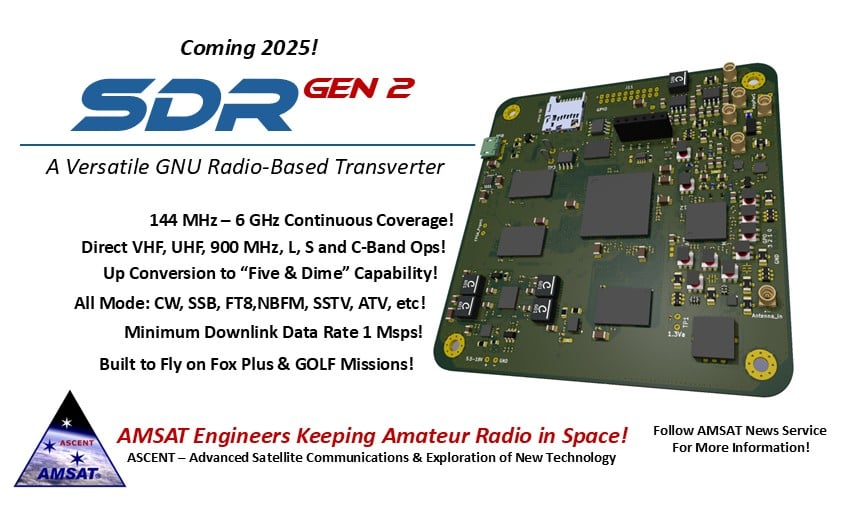
Registration Remains Open for AMSAT Symposium, Presentations Invited
Registrations & room reservations remain available for the 43rd Annual AMSAT Space Symposium & Annual General Meeting to be held Thursday, October 16 to Sunday, October 19 at the Holiday Inn & Suites Phoenix Airport North, 1515 North 44th Street Phoenix, AZ. Early Bird registration remains available until September 15 at https://launch.amsat.org/Events

Photo: Holiday Inn Suites Phoenix Airport North
Rooms for the 43rd AMSAT Annual Space Symposium and Annual General Meeting have been going fast but more are now available. At an affordable price of $140 per night plus tax, these rooms will go fast. More information of room reservations can be found at: https://www.amsat.org/43rd-amsat-space-symposium-and-annual-general-meeting/
Proposals for Symposium papers and presentations are invited on any topic of interest to the amateur satellite community. We request a tentative title of your paper or presentation as soon as possible, with final copy submitted by October 8 for inclusion in the Symposium Proceedings. Proposals for presentations at the Symposium do not require a paper. Presentations will be recorded and made available on AMSAT’s YouTube Channel and transcribed and published with its slides in the Proceedings. Proposals should be sent to Frank Karnauskas, N1UW via f.karnauskas [at] amsat.org

Liam Cheney (Photo: Footstep Aerospace)
Keynote speaker at the Symposium will be Liam Cheney, an aerospace consultant and founder of Footstep Aerospace by AG3, LLC. Mr. Cheney supports mission integration, strategy, and business development for the space industry. He holds a Master’s degree in Aerospace Engineering from Cal Poly, San Luis Obispo, is a certified Project Management Professional, and a member of AMSAT.
[ANS thanks AMSAT for the above information.]
NASA Satellite That Scientists and Farmers Rely On May Be Destroyed On Purpose
The Trump administration has asked NASA employees to draw up plans to end at least two major satellite missions, according to current and former NASA staffers. If the plans are carried out, one of the missions would be permanently terminated, because the satellite would burn up in the atmosphere.
The data the two missions collect is widely used, including by scientists, oil and gas companies and farmers who need detailed information about carbon dioxide and crop health. They are the only two federal satellite missions that were designed and built specifically to monitor planet-warming greenhouse gases.
It is unclear why the Trump administration seeks to end the missions. The equipment in space is state of the art and is expected to function for many more years, according to scientists who worked on the missions. An official review by NASA in 2023 found that “the data are of exceptionally high quality” and recommended continuing the mission for at least three years.
Both missions, known as the Orbiting Carbon Observatories, measure carbon dioxide and plant growth around the globe. They use identical measurement devices, but one device is attached to a stand-alone satellite while the other is attached to the International Space Station. The standalone satellite would burn up in the atmosphere if NASA pursued plans to terminate the mission.
Presidential budget proposals are wish lists that often bear little resemblance to final congressional budgets. The Orbiting Carbon Observatory missions have already received funding from Congress through the end of the 2025 fiscal year, which ends Sept. 30. Draft budgets that Congress is currently considering for next year keep NASA funding basically flat. But it’s not clear whether these specific missions will receive funding again, or if Congress will pass a budget before current funding expires on Sept. 30.
Last week, NASA announced it will consider proposals from private companies and universities that are willing to take on the cost of maintaining the device that is attached to the International Space Station, as well as another device that measures ozone in the atmosphere.
The missions are called Orbiting Carbon Observatories because they were originally designed to measure carbon dioxide in the atmosphere. But soon after they launched, scientists realized that they were also accidentally measuring plant growth on Earth.
Basically, when plants are growing, photosynthesis is happening in their cells. And that photosynthesis gives off a very specific wavelength of light. The OCO instruments in space measure that light all over the planet.
“NASA and others have turned this happy accident into an incredibly valuable set of maps of plant photosynthesis around the world,” explains Scott Denning, a longtime climate scientist at Colorado State University who worked on the OCO missions and is now retired. “Lo and behold, we also get these lovely, high resolution maps of plant growth,” he says. “And that’s useful to farmers, useful to rangeland and grazing and drought monitoring and forest mapping and all kinds of things, in addition to the CO2 measurements.”
The cost of maintaining the two OCO satellite missions up in space is a small fraction of the amount of money taxpayers already spent to design and launch the instruments. The two missions cost about $750 million to design, build and launch, according to David Crisp, a retired NASA scientist.
By comparison, maintaining both OCO missions in orbit costs about $15 million per year, Crisp says. That money covers the cost of downloading the data, maintaining a network of calibration sensors on the ground and making sure the stand-alone satellite isn’t hit by space debris, according to Crisp.
“Just from an economic standpoint, it makes no economic sense to terminate NASA missions that are returning incredibly valuable data,” Crisp says.
[ANS thanks National Public Radio for the above information. Read the complete article at https://www.npr.org/2025/08/04/nx-s1-5453731/nasa-carbon-dioxide-satellite-mission-threatened]
Want to fly the colors on your own grid expedition?
Get your AMSAT car flag and other neat stuff from our Zazzle store!
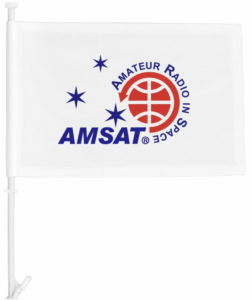
25% of the purchase price of each product goes towards
Keeping Amateur Radio in Space
https://www.zazzle.com/amsat_gear
Changes to AMSAT-NA TLE Distribution for August 15
Two Line Elements or TLEs, often referred to as Keplerian elements or keps in the amateur community, are the inputs to the SGP4 standard mathematical model of spacecraft orbits used by most amateur tracking programs. Weekly updates are completely adequate for most amateur satellites. TLE bulletin files are updated daily in the first hour of the UTC day. New bulletin files will be posted immediately after reliable elements become available for new amateur satellites. More information may be found at https://www.amsat.org/keplerian-elements-resources/.
With HamTV becoming active on ISS, orbital elements are now updated twice daily in http://www.amsat.org/tle/ at 00:18 and 12:18 UTC. The intention is to have high quality TLE available to accurately calculate doppler shift for the 2.935 GHz downlink. Observations comparing these TLE to those that were caclulated based ephemerides and TLE produced by Johnson Space Center the last time HAMTV was active are desired, write jfitzgerald [at] amsat.org
Assignments to some of the Tevel2 satellites have been updated to match object numbers.
The following satellites have been removed from this week’s distribution:
CSIM NORAD Cat ID 43793 Decayed from orbit on or about 09 August 2025
[ANS thanks Joe Fitzgerald, KM1P, AMSAT Orbital Elements Manager for the above information]
AMSAT Remove Before Flight Key Tags Now Available

Yes, These are the Real Thing!
Your $20 Donation Goes to Help Fly a Fox-Plus Satellite
Includes First Class Postage (Sorry – U.S. Addresses Only)
Order Today at https://www.amsat.org/product/amsat-remove-before-flight-keychain
ARISS NEWS
Amateurs and others around the world may listen in on contacts between amateurs operating in schools and allowing students to interact with astronauts and cosmonauts aboard the International Space Station. The downlink frequency on which to listen is 145.800 MHz worldwide.

COMPLETED
N. Sultanov International Aerospace School, Republic of Bashkortostan, Russia, direct via RC4P
The ISS callsign was RSØISS
The crewmember was Sergey Ryzhikov
The ARISS mentor was RV3DR
Contact was successful for Mon 2025-08-11 07:51 UTC
Congratulations to the N. Sultanov International Aerospace School students, Sergey, mentor RV3DR, and ground station RC4P!
UPCOMING
Youngsters On The Air, Jambville, France, Direct via FX5YOTA
The ISS callsign is presently scheduled to be OR4ISS
The scheduled crewmember is Mike Fincke KE5AIT
The ARISS mentor is F6ICS
Contact is go for: Tue 2025-08-19 09:18:53 UTC 82 deg
Watch for Livestream at https://www.youtube.com/watch?v=MARkTcR6Njo
NixderStelar (formerly Gemini-1), Lima, Peru, telebridge via VK4KHZ
The ISS callsign is presently scheduled to be NA1SS
The scheduled crewmember is Zena Cardman KJ5CMN
The ARISS mentor is VE6JBJ
Contact is go for: Wed 2025-08-20 14:08:05 UTC 81 deg
The crossband repeater continues to be ACTIVE (145.990 MHz up {PL 67} & 437.800 MHz down). If any crewmember is so inclined, all they have to do is pick up the microphone, raise the volume up, and talk on the crossband repeater. So give a listen, you just never know.
The packet system is also ACTIVE (145.825 MHz up & down).
As always, if there is an EVA, a docking, or an undocking; the ARISS radios are turned off as part of the safety protocol. Next expected outage: Ham TV (2395.00 MHz down) will power down on Monday 18 August at 14:15 UTC and power up on Wednesday 20 August at approximately 12:35 UTC.
Note, all times are approximate. It is recommended that you do your own orbital prediction or start listening about 10 minutes before the listed time.
The latest information on the operation mode can be found at https://www.ariss.org/current-status-of-iss-stations.html
The latest list of frequencies in use can be found at https://www.ariss.org/contact-the-iss.html
[ANS thanks Charlie Sufana, AJ9N, one of the ARISS operation team mentors for the above information]
AMSAT Ambassador Activities
AMSAT Ambassadors provide presentations, demonstrate communicating through amateur satellites, and host information tables at club meetings, hamfests, conventions, maker faires, and other events.
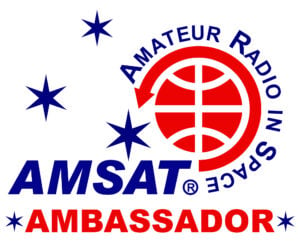
August 16-17, 2025
Huntsville Hamfest 2025
Von Braun Center South Hall
700 Monroe St. SW
Huntsville, AL 35801
https://hamfest.org/
N8DEU, WD4ASW, KE4AL, W4FCL
August 21-24, 2025
Northeast HamXposition (HamX) & New England ARRL Convention
Best Western Royal Plaza & Trade Center
181 Boston Post Road W
Marlborough, MA 01752
http://www.HamX.org
W1EME, WD4ASW, WB1FJ
September 6, 2025
Greater Louisville Hamfest
Paroquet Springs Conference Centre
395 Paroquet Springs Drive
Shepherdsville, KY 40165
https://louisvillehamfest.wixsite.com/louisvillehamfest
W4FCL
October 11, 2025
North Star Radio Convention
Hennepin Technical College
9000 Brooklyn Boulevard
Brooklyn Park, MN 55445
https://northstarradio.org/
ADØHJ
October 16, 17, 18, 19, 2025
AMSAT Board of Directors Meeting and 43rd Annual AMSAT Space Symposium & Annual General Meeting
Holiday Inn & Suites Phoenix Airport North
1515 North 44th Street
Phoenix, Arizona 85008
Details at https://www.amsat.org/2025-symposium/
[ANS thanks Bo Lowrey, W4FCL, Director – AMSAT Ambassador Program, for the above information]
Satellite Shorts From All Over
+ AMSAT-Deutschland will host the Bochum Space Days event from September 19 to 21, 2025. In cooperation with the Bochum Observatory, AMSAT-Deutschland e.V. is offering a varied and informative program aimed at AMSAT members and all space enthusiasts. The focus is on current developments and future prospects for national and international amateur radio satellites and other space projects. Lectures, presentations and exciting discussions will provide participants with valuable insights into the latest technologies, missions and research projects in space travel. See https://amsat-dl.org/en/save-the-date-bochum-space-days-2025/ for details. (ANS thanks AMSAT-DL for the above information.)
+ If you happen to read Japanese, the latest JAMSAT Newsletter No.318 includes JAMSAT’s next Transponder Board Project “Blueberry JAM,” as well as an invitation to HamFair2025 in Tokyo next weekend. See it at https://bit.ly/43kOW7v (ANS thanks Mikio Mouri, JA3GEP, JAMSAT Newsletter Editor, for the above information.)
+ The September 2025 issue of QST Magazine contains a review of the Halibut Electronics EggNOGS Antenna. The reviewer recommends this low-cost “eggbeater” antenna array primarily for receiving in unattended operations, such as weather satellite and SatNOGS ground stations. However, the kit has options for low power uplink transmissions, as well. The detailed review appears on pages 45-49 of the magazine, or see https://electronics.halibut.com/ for the manufacturer’s website. (ANS thanks QST Magazine for the above information.)
+ NASA Astronaut James A. Lovell (Captain, USN, Ret.), veteran of the Gemini VII, Gemini XII, and Apollo 8 missions before becoming the Mission Commander for the nearly disastrous Apollo 13 mission to the Moon, died August 7 at the age of 97. Lovell joined NASA in 1962 as part of its second group of astronauts. He was selected as backup commander to Neil Armstrong for the Apollo 11 lunar landing mission, and would have been the fifth human to walk on the moon, had it not been for the Apollo 13 “problem.” (ANS thanks NASA for the above information.)
+ SpaceX is now offering Starship flights to Mars, with Italy signing up as the first customer to send payloads. However, there is no announced start date for providing the service. (ANS thank The Orbital Index for the above information.)
+ Astronomers using the NASA/ESA/CSA James Webb Space Telescope have found strong evidence of a giant planet orbiting a star in the stellar system closest to our own Sun. At just four light-years away from Earth, the Alpha Centauri triple star system has long been a compelling target in the search for worlds beyond our solar system. If confirmed, the planet would be the closest to Earth that orbits in the habitable zone of a Sun-like star. However, because the planet candidate is a gas giant, scientists say it would not support life as we know it. (ANS thanks the European Space Agency for the above information.)
+ A newly released report states that in 2023, LIGO, the Laser Interferometer Gravitational-wave Observatory at CalTech, detected the most massive black hole merger yet, in which rapidly spinning black holes with masses of roughly 100 M☉ and 140 M☉ (M☉= 1 solar mass) merged to form a 225 M☉ black hole. Notice that 100 + 140 = 240 M☉, but the final object weighs a meager 225 Suns, meaning that 15 M☉ were converted directly into gravitational energy in this event, totaling 3 x 1048 Joules —- more energy than the combined stellar output of every star in the visible universe in that moment! (ANS thanks The Orbital Index for the above information.)
Join AMSAT today at https://launch.amsat.org/
In addition to regular membership, AMSAT offers membership to:
* Societies (a recognized group, clubs or organization).
* Primary and secondary school students are eligible for membership at one-half the standard yearly rate.
* Post-secondary school students enrolled in at least half time status shall be eligible for the student rate for a maximum of 6 post-secondary years in this status.
* Memberships are available for annual and lifetime terms.
Contact info [at] amsat.org for additional membership information.
73 and remember to help Keep Amateur Radio in Space!
This week’s ANS Editor, Mark Johns, KØJM
mjohns [at] amsat.org
ANS is a service of AMSAT, the Radio Amateur Satellite Corporation, 712 H Street NE, Suite 1653, Washington, DC 20002

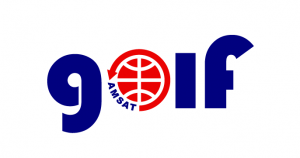

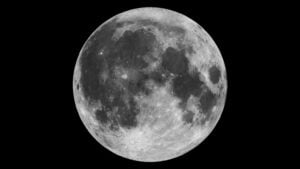 (Photo credit: NASA)
(Photo credit: NASA)